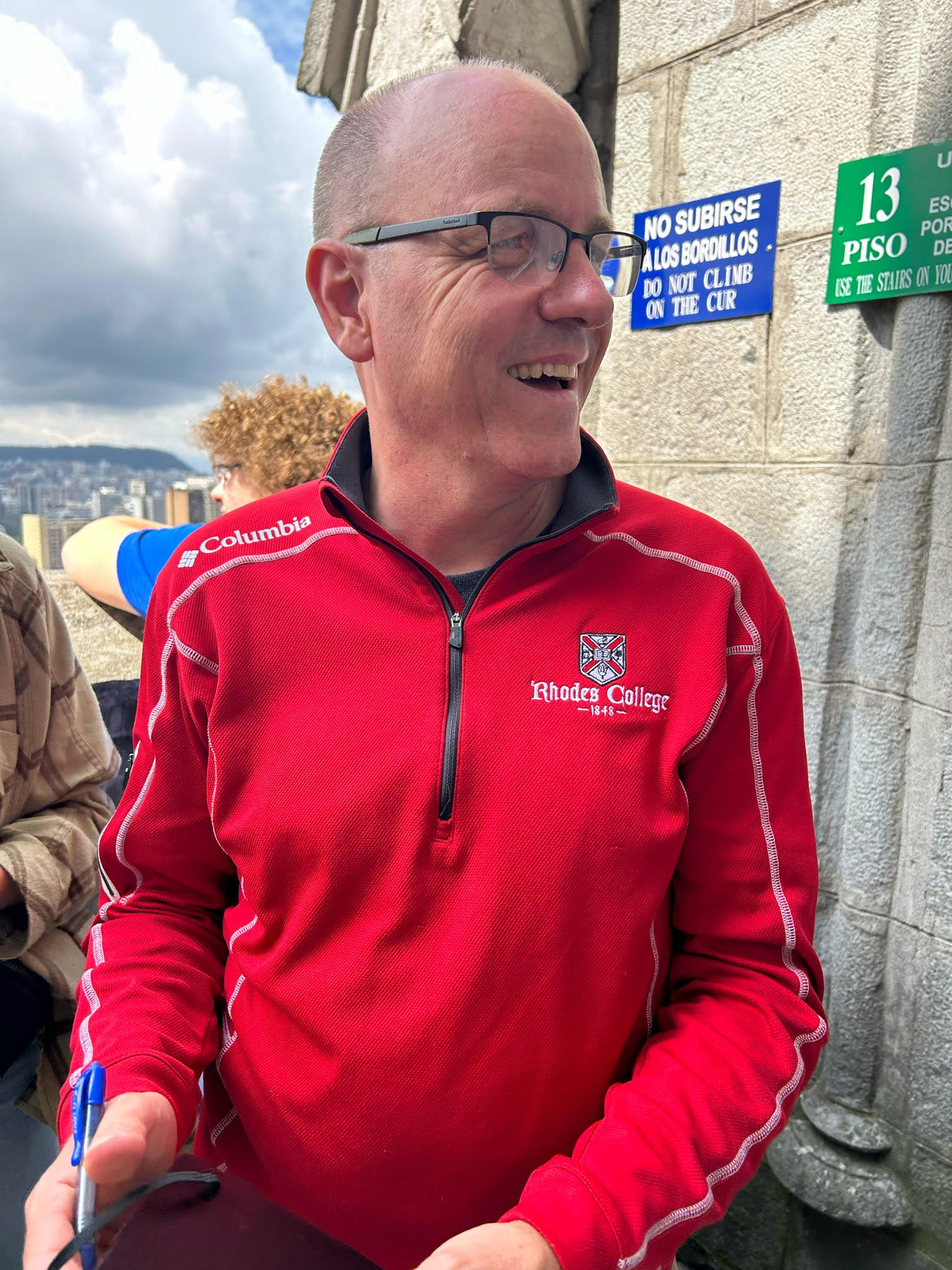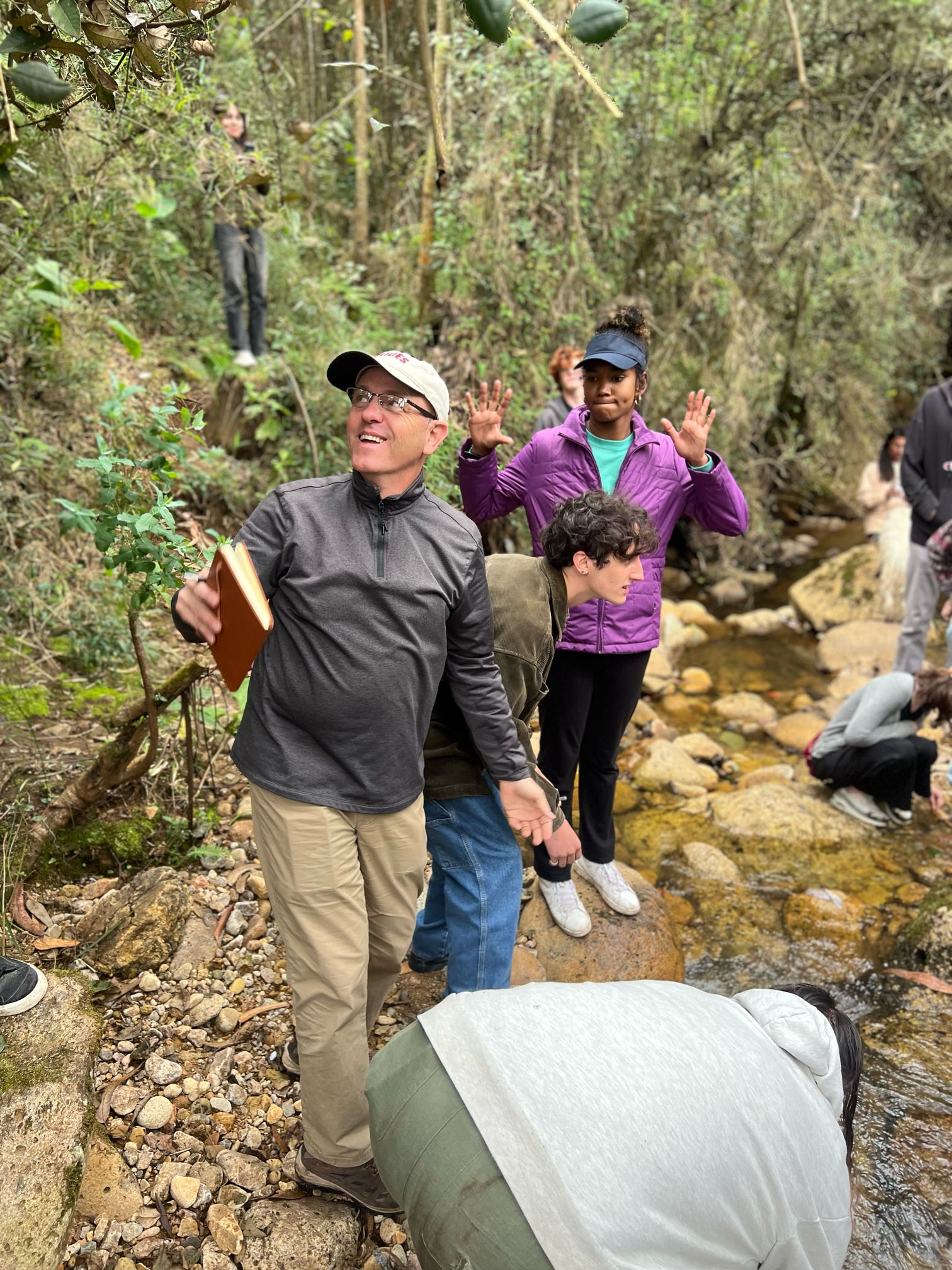In collaboration with Rhodes and Centre, Sewanee is thrilled to offer this unique program in Ecuador, which explores various environmental challenges of today and tomorrow through an integrated lens of science and humanities in place-based courses.
Quick Facts
Where: Ecuador (Cuenca, Amazon, and the Galapagos)
Tentative Dates: Aug. 31, 2026 - Dec. 15, 2026
What: The Global Environmental Challenges program explores various environmental challenges of today and tomorrow through an integrated lease of science and humanities in place-based courses. The semester-long program is based in Ecuador and will spend twelve weeks in the highlands of Cuenca, followed by a three-week module at a biodiversity station in the Amazon and in the Galápagos Islands. Students who participate in the program will be able to:
- Recognize and analyze complex environmental challenges and local responses from the perspective of diverse stakeholders, particularly considering Latin America v. the U.S.
- Consider multiple definitions of sustainability within a specific local and national context
- Grow in empathy and in linguistic and cultural competency through sustained engagement with local communities
- Learn, apply, and/or evaluate natural and social science field methodologies in local contexts
Cost: Students pay Sewanee comprehensive tuition and fees and will continue to receive Sewanee aid and scholarships during the Global Environmental Challenges program.
Faculty Leader: Eric Henager Ph.D., Rhodes College


Contact for Additional Information: global@sewanee.edu
How to apply: Set up an account and apply through Via.
Program Overview
Academics
Students will take a full course load on the Global Environmental Challenges program. Students will enroll in three courses in Cuenca over a span of 12 weeks; the fourth course, Environment, Conservation, and Policy Issues in Ecuador, will be taught as a three-week module in the Amazon river basin and the Galapagos. There is no Spanish requirement to enroll in the program; however, all students will be required to take a Spanish language course at their level. The following are the proposed courses for the program, pending final faculty approval.
- ENST 219: Environment, Conservation, and Policy Issues in Ecuador (4 Credits; Required)
- This course introduces students to the most influential factors shaping the ecosystems and their conservation, looking at the global, regional and local factors that determine the climates and the contrasting ecosystems that can be found in Ecuador. The course includes several field visits to the Ecuadorian Amazon (Tiputini Biodiversity Station) and the Galapagos Islands. Thus, allowing students to experience first-hand current topics of conservation and policy issues, while discussing the main environmental challenges associated with the conservation of natural ecosystems in tropical developing countries.
- SPAN XXX (4 credits; Required): Options include two levels of beginner, two levels of intermediate, two levels of advanced grammar, and two advanced content courses.
- ENST 225: Environmental Challenges: Linking the Global to the Local (General Education 7; Required)
- This course examines local environmental challenges in Cuenca, Ecuador, and explores connections to the broader global context. Emphasis will be placed on learning about the ways and beliefs of local cultures and understanding the difficulties in maintaining cultural identity in today’s environmental economic climate. Experiential learning will be a significant element of the course, and students will regularly visit local communities and NGOs so that students can learn from those who are most affected by these issues. Only open to students approved through the Office of Global Citizenship for the Global Environmental Challenges semester program.
- SPAN/ENST XXX: Andes, Amazon, and Galápagos: Representations and Debates (4 Credits; Required)
-
Students will explore works of fiction, poetry, essays, and media to analyze and interpret how writers, filmmakers, and journalists represent three extraordinary regions of Latin America: the Andes, the Amazon, and the Galápagos. This class will be taught in English and in Spanish. This course is taught by Dr. Henager.
-
Housing
Students will stay with local host families while in Cuenca and the Galapagos. Students stay on-site at the Tiputini Biodiversity Station in dorm-style rooms. The program provides approximately 20 meals per week for students.
Student Support
- Airport pickup
- On-site orientation upon arrival in both Cuenca, Ecuador and Quito, Ecuador
- Homestays
- 20 meals per week
- Co-curricular cultural events
- Weekend excursions around Ecuador
visa
- Students must secure a 180-day visa prior to departure. Information on applying for a visa can be found HERE.
TentaTIVE DATES
- Sept 8: Depart the United States and arrive in Quito, Ecuador
- Sept 9: Quito to Banos; Overnight at local Hotel
- Sept 10: Excursion to Banos waterfalls
- Sept 11: Banos to Cuenca; Meet Host Family
- Sept 12: Welcome & Program Orientation
- Sept 15: Classes Begin
- Oct 2-3: Saraguro Excursion
- Oct 10: Pisos Altitudinales
- tbd: Final exams
- nOV 28: Arrive in Quito and check into hotel lodging
- Nov 19: USFQ Cumbaya Orientation
- Dec 1 - 7: Tiputini Biodiversity Station (TBS) in the amazon river basin
- tbd: overnight in Quito
- Dec 8 - 21: Galapagos Portion Begins (San Cristobal, isabela, and Santa Cruz)
- Dec 21: Program ends; students depart for the U.S.


